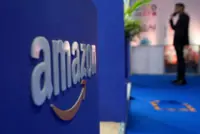
Volocopter’s ‘VoloCity’ is a two-seat electric vertical take-off and landing aircraft that resembles a gigantic insect crowned with 18 rotors. — AFP Relaxnews
A German company is seeking to use the exposure generated by the Paris Olympics to overcome the opposition of local politicians and demonstrate that flying taxis can serve the French capital.
Volocopter hopes that by being certified in Paris – which has some of the strictest regulations for over-flights – it can prove that flying taxis aren’t just science fiction gimmicks.
Uh-oh! Daily quota reached.










































